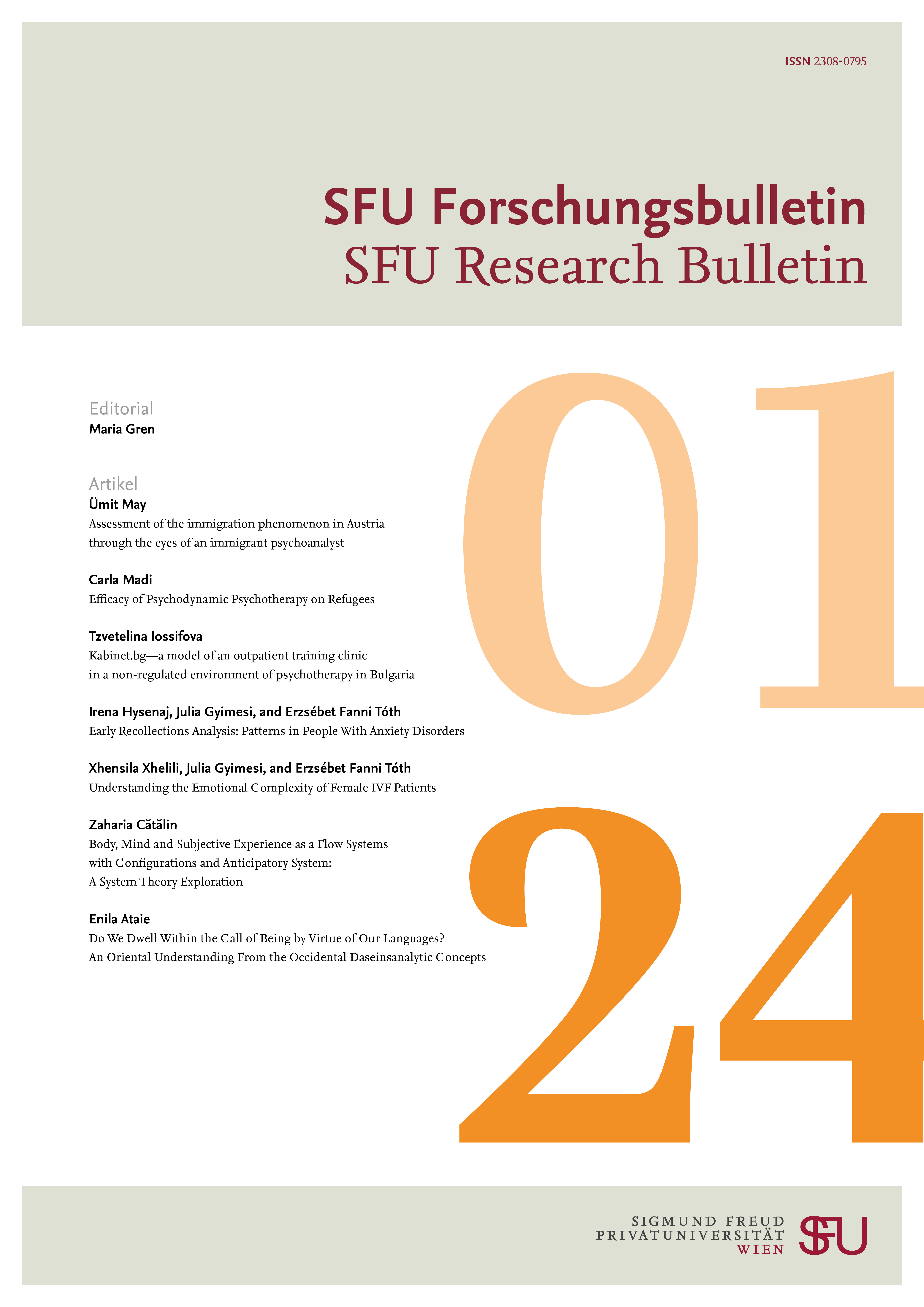Wirksamkeit psychodynamischer Psychotherapie bei Flüchtlingen
DOI:
https://doi.org/10.15135/2024.12.1.14-21Abstract
Die Flüchtlingskrisen haben weltweit große Auswirkungen und veranlassen häufig Berufsgruppen wie Ärzte, Sozialwissenschaftler und Psychoanalytiker dazu, Hilfe anzubieten. Das dringende Bedürfnis nach Sicherheit und Stabilität ist offensichtlich, ebenso wie das einfühlsame Zuhören der Psychotherapeuten, um den Schmerz der Flüchtlinge zu lindern. Die psychodynamische Psychotherapie hat sich bei der Linderung von traumabedingten Symptomen als wirksam erwiesen. Studien in der Prozess- und Ergebnisforschung belegen Zeit die Wirksamkeit der psychodynamischen Psychotherapie, indem sie mit theoretischen Ansätzen wie der Bindungstheorie verknüpft werden, um Veränderungsprozesse aufzudecken. Das Ziel der psychodynamischen Psychotherapie ist die Wiederherstellung von Bindungs- und Vertrauensproblemen. Bindungs- und Vertrauensprobleme können durch Übertragung wiederhergestellt werden und dem Patienten ermöglichen, Sinn in den Erfahrungen zu finden.
References
Acarturk, C., Konuk, E., Cetinkaya, M., Senay, I., Sijbrandij, M., Cuijpers, P., & Aker, T. (2015). EMDR for Syrian refugees with posttraumatic stress disorder symptoms: Results of a pilot randomized controlled trial. European Journal of Psychotraumatology, 6(1), 27414.
Brom, D., Kleber, R. J., & Defares, P. B. (1989). Brief psychotherapy for posttraumatic stress disorders. Journal of Consulting and Clinical psychology, 57(5), 607–612. https://doi.org/10.1037//0022-006x.57.5.607
Brune, M., & Orosa, J.E. (2014). Effectiveness of psychotherapy for traumatized refugees without a secure residency status. International Journal of Migration, Health and Social Care, 1 (1), 52-59.
Drozdek, B. (1997). Follow-up study of concentration camp survivors from Bosnia-Herzegovina: Three years later. Journal of Nervous and Mental Disease, 185(11), 690-694.
Katsounari, I. (2013). The influence of sociocultural factors on the eating attitudes of Lebanese and Cypriot students: A cross-cultural study. Journal of Human Nutrition and Dietetics, 26, 45- 52.
Klerman, G., Weissman, M., Rounsaville, B., & Chevron, E. (1984). Interpersonal Psychotherapy of Depression. Basic Books.
Krupnick, J. (1980) pathological grief and the activation of latent self-images. The American Journal of Psychiatry, 137(10), 1157.
Kruse, J., Joksimovic, L., Cavka, M., Wöller, W., & Schmitz, N. (2009). Effects of trauma- focused psychotherapy upon war refugees. Journal of Traumatic Stress, 00(0), pp. 1– 8.
Leuzinger-Bohleber, M., Rickmeyer, C., Tahiri, N., & Fischmann, T. (2016). Special communication. What can psychoanalysis contribute to the current refugee crisis? Preliminary reports from STEP-BY-STEP: A psychoanalytic pilot project for supporting refugees in a “first reception camp” and crisis interventions with traumatized refugees. The International Journal of Psychoanalysis, 97(4), 1077-93.
Mok, S.Y. (2015). It’s their responsibility, not ours. Social Psychology, 47(2).
Meffert, S.M., Abd Alla, O.A., Metzler, T.J., Abdo, A.O., Elmakki, Y.O.M., & Marmar, C. (2011). A pilot randomized controlled trial of interpersonal psychotherapy for sudanese refugees in Cairo, Egypt. American Psychological Association, 1942-9681.
Murray, K.E., Davidson, G.R., & Schweitzer, R.D. (2010). Review of refugee mental health interventions following resettlement: best practices and recommendations. American Orthopsychiatric Association, 80(4), 576-585.
Schottenbauer, M.A., Glass, C.R., Arnkoff, D.B., & Gray, S.H. (2008). Contributions of psychodynamic approaches to treatment of psychopathology literature. Psychiatry, 71(1).
Shedler, J. (2009). The efficacy of psychodynamic psychotherapy. Retrieved from American Psychological Association website: www.apa.org/journals.
Spermon, D., Darlington, Y. & Gibney, P. (2010). psychodynamic psychotherapy for complex trauma: targets, focus, applications, and outcomes. Psychology Research and Behavior Management, 3, 119-127.
Varvin, S. (2018). Refugees, their situation and treatment needs. International Journal of Applied Psychoanalytic Studies, 15, 174–186.
Varvin, S. (2019). Psychoanalysis and the situation of refugees. A Human Rights perspective. In Press in Psychoanalysis, Law and Society, 1st edition.
Weine, S. M., Kulenovic, A. D., Pavkovic, I., & Gibbons, R. (1998). Testimony psychotherapy in Bosnian refugees: a pilot study. The American Journal of Psychiatry, 155(12), 1720–1726. https://doi.org/10.1176/ajp.155.12.1720
Yakely, J. (2014). Psychodynamic psychotherapy: developing the evidence base. Advances in Psychiatric Treatment, 20, 269-279.
Yalom, I.D. (1995). The Theory and Practice of Group Psychotherapy (4th ed.). Basic Books.
Downloads
Published
Issue
Section
License
The reproduction of articles published in any form is allowed under the condition that the citation is comprehensive. Prints in other publication media or public media require the written consent of the editor and can be requested under: forschung@sfu.ac.at
